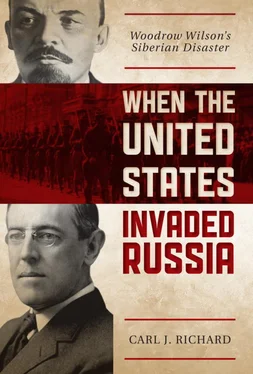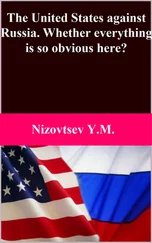The First Russian Revolution
Thus, in March 1917 (February in the less accurate Julian calendar still employed in Russia at the time), the czarist regime was overthrown. A Provisional Government was established, pending the election of a constituent assembly. While the March Revolution was partly the result of hunger in the cities caused by a transportation breakdown, it was also the result of the disasters suffered by Russian troops, which were attributed to the incompetence and corruption of the czarist government. Angered by the brutal repression of the people by the czar’s more loyal Cossacks, many Russian soldiers not only refused to aid in the repression but joined the revolutionary soviets, committees that formed spontaneously in military units and workshops. [28] Keegan, First World War , 333–35.
Unfortunately, the Allies did not understand the causes of the March Revolution. They seemed to regard it as a manifestation of the “true democratic spirit” of the Russian people rather than as a result of war exhaustion. Thus, when Wilson addressed Congress to call for a declaration of war against Germany the following month, he cited the “wonderful and heartening” events in Russia and called the Allied effort a war to make the world “safe for democracy,” now that the sole autocratic regime among the Allies had been replaced by a democratic government. Remarkably, he further asserted that the Romanov dynasty “was not in fact Russian in origin, character, or purpose” and proclaimed that “Russia was… always in fact democratic at heart.” Now that the alien despotism had been shaken off, the Russian people would add their might to the forces that were fighting for freedom in the world. Because the Allies did not appreciate the extent of Russian war weariness and because they desperately needed help against the Central Powers, they pressured the Provisional Government into continuing the war. Misconstruing Russian military problems, they redoubled their effort to ship unnecessary weapons and supplies to the Russians. Thus, during the short life of the Provisional Government, mountains of Allied supplies lay on the docks at Archangel and Vladivostok, where bureaucratic inefficiency and an overloaded railway system conspired to keep them. [29] George F. Kennan, Russia and the West under Lenin and Stalin (Boston: Little, Brown, 1960), 68, 93; Stone, Eastern Front , 157; David S. Foglesong, America’s Secret War against Bolshevism: U.S. Intervention in the Russian Civil War, 1917–1920 (Chapel Hill: University of North Carolina Press, 1995), 50–51.
After the new “Kerensky Offensive,” so named for the Provisional Government’s prime minister and war minister Alexander Kerensky, failed in Galicia within a matter of days in July and a German counteroffensive took eastern Galicia in August and Riga in September, the authority of the Provisional Government collapsed. Desertions from the army soared and violent mutinies ensued, as soldiers were reduced to a diet of rotten herring. Many Russians now felt the same bitter resentment toward the Provisional Government that they had felt toward the czarist regime. As the historian H. Stuart Hughes has written concerning the failure of the Kerensky Government, “The explanation of this failure is simple—the provisional government had not done the two things for which the people were clamoring: it had not taken Russia out of the war, and it had not satisfied the land hunger of the peasantry.” He might have added that it had not solved the railway crisis that produced famine in the cities and rampant inflation throughout the nation. The overburdening of the primitive railway system by the massive increase in demand produced by the war generated an inflationary spiral that, in turn, led to a strike by the low-paid railway workers that only exacerbated the crisis. On the evening of his arrival at the Finland station in Petrograd on April 16, Bolshevik leader Vladimir Ilyich Lenin explained his three-part program to a cheering crowd. The program called for an immediate peace with the Central Powers, the nationalization of land, and an increase in power for the local soviets. By far, the most pressing of the needs addressed by Lenin’s program was the need for peace. [30] Stone, Eastern Front , 282, 284, 288, 295, 299–301; Hughes, Contemporary Europe , 69, 89; Keegan, First World War , 338–39.
On November 7, 1917, the Bolsheviks seized power. In December the new Soviet Government signed an armistice, and the following March a peace treaty, with the Central Powers. The Treaty of Brest-Litovsk granted huge concessions, including nearly half a million square miles, an area three times the size of Germany, to the Central Powers, in exchange for the desperately needed peace. The land surrendered included the Ukraine, Finland, and Transcaucasia, as well as territory in Poland and the Baltic States that Russia had occupied for a century and a half. [31] Keegan, First World War , 342.
The Allies’ failure to comprehend the extent of Russian war exhaustion, when combined with the Allies’ own desperate need for aid against the Central Powers, led them to the policy of intervention in Russia. The same exhaustion would help lead to the utter failure of that policy.
CHAPTER TWO

The Shadow of a Plan
I have been sweating blood over the question what is right and feasible to do in Russia. It goes to pieces like quicksilver under my touch.
—President Woodrow Wilson, July 8, 1918, two days after his decision to intervene in Siberia
[1] Charles Seymour, ed., The Intimate Papers of Colonel House Arranged as a Narrative (Boston: Houghton-Mifflin, 1926–1928), vol. 3, 415.
Historians have proposed at least six theories to explain U.S. intervention in Siberia in 1918. In this chapter I will evaluate each of these hypotheses in order to shed some light on the chaotic situation into which President Wilson dispatched thousands of American soldiers. I will demonstrate that each of these theories is incorrect except the last, the hypothesis that Wilson sent American forces to Siberia to help the Czechs and Russian anti-Bolsheviks overthrow the Soviet Government as the first step in re-creating the Eastern Front against the Central Powers with Russian troops.
Siberia is a vast land of almost five million square miles. It extends nearly 4,000 miles between Chelyabinsk just east of the Ural Mountains and Vladivostok on the Pacific Ocean and approximately 1,750 miles between the Arctic Ocean and the borders of China and central Asian nations. While western Siberia is flat and marshy, eastern Siberia is hilly, rough, and thickly forested. Eastern Siberia boasts Lake Baikal, the largest freshwater lake in the world, 5700 feet at its deepest, fed by over 300 rivers. Siberia is frost free only about half the time of European Russia. Russian colonization of Siberia dates only from 1581–1582, but the Russian population began to outstrip that of the various Asiatic native groups long before the construction of the Trans-Siberian Railway (1891–1905) cemented the region’s connection to European Russia. At the time of the intervention Siberia was still a frontier area partly populated by recent immigrants fleeing war and searching for opportunity. It was a region largely unhampered by the tradition of serfdom that characterized European Russia and possessed a much larger percentage of small landowners. [2] N. G. O. Pereira, White Siberia: The Politics of Civil War (Montreal: McGill-Queen’s University Press, 1996), 11–15; Carol Willcox Melton, Between War and Peace: Woodrow Wilson and the American Expeditionary Force in Siberia, 1918–1921 (Macon, Ga.: Mercer University Press, 2001), 34.
Читать дальше













